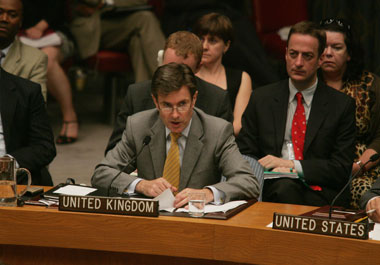NEW YORK - At the height of the US-USSR Cold War in the 1960s, the UN Security Council was a vibrant political battleground for the Soviets and the Americans.
The veto was the preferred weapon of war as the US and the then Soviet Union kept pummeling each other by vetoing key Security Council resolutions to protect their national interests and their political and military allies worldwide.
During the infamous Cuban missile crisis, when the Soviets and the Americans were on the verge of a nuclear war over the reported presence of nuclear missiles in Cuba, the legendary US Ambassador Adlai Stevenson once went head-to-head with Soviet envoy Valerian Zorin in the Security Council chamber.
As old UN hands would recall, Stevenson aggressively sought a response from Zorin over allegations of Soviet nuclear missiles stationed in Cuba.
 |
| British Permanent Representative to the United Nations John Sawers speaks during a meeting of the Security Council at the United Nations July 11, 2008 in New York City. China and Russia vetoed a U.S. draft resolution to impose sanctions against the government of Zimbabwe. Pic Getty Images/AFP |
"Yes or No," Stevenson demanded, and added the punchline: "And don't wait for the translation", as he pressed for a immediate answer.
The translation, from English to Russian, which came over the earpiece, would only take a couple of seconds. But Stevenson, relaying the urgency of the matter and in an attempt at diplomatic showmanship, didn't want that split second delay in getting a response from the Soviet ambassador.
Zorin turned to Stevenson and said: "I am not in an American court of law, and do not wish to answer the question put to me in the manner of a prosecuting counsel." And Stevenson famously responded that he will wait for an answer "until hell freezes over."
Judging by the recent political deadlock in the Security Council -- over Iran, Myanmar (Burma), Palestine, Zimbabwe and Sudan -- one wonders whether the days of the Cold War are back in vogue.
In January last year, a Western-backed and US-led move to castigate the Burmese government for human rights violations suffered a rare double veto, both from China and Russia.
Last week, history repeated itself when these two big powers exercised their vetoes again -- this time to stall a resolution aimed at imposing sanctions against Zimbabwe. Perhaps more interesting was the political drama that followed the humiliating defeat of the Western resolution.
After the vote, Ambassador John Sawers of Britain, one of the co-sponsors of the resolution, made the supreme mistake of challenging the Russian veto by pointing out that the Russians may have reneged on a promise made at the G8 summit meeting in Japan the previous week.
Sawers said Russia's action was "frankly, inexplicable," because "only three days ago, the meeting of the Group of Eight leaders, which of course includes President Medvedev of Russia, adopted a statement of a UN special envoy, and went onto say: 'We will take further steps, inter alia, introducing financial and other measures against those individuals responsible for violence.'"
That statement from Sawers brought a strong rejoinder from Russian Ambassador Vitaly Churkin: a statement reminiscent of the days of the Cold War. "I wish first of all to respond to the irresponsible and factually inaccurate statement made by the Permanent Representative of the United Kingdom, who took upon himself to interpret the Russian position, with reference to a decision of the Group of Eight."
Implicitly accusing the British envoy of lying (a rare accusation in the chamber of the Security Council), Churkin said that anyone who read the G8 decision should know that it makes no reference to the actions of the Security Council.
Regardless of Churkin's statement, US Ambassador Zalmay Khalilzad, who addressed the Security Council later, continued to follow in the political footsteps of the Brits. "The Russian performance here today raises questions about the Russian Federation's reliability as a G8 partner," he said.
Not to be outdone, the Russians came out even more strongly with a press release criticising both the US and the UK. "We regard such statements as unacceptable. The representatives of the US and Britain (to the UN) are at best uninformed about the G8 leaders' discussion in Toyako (Japan), and at worst they are deliberately distorting the facts."
The next round will be another battle between Russia and China on one side and Britain, the US and France on the other: this time over a move to indict the President of Sudan Omar Hassan Ahmad Al-Bashir for genocide and war crimes in Darfur -- the first against a sitting head of state.
The Western powers, led by the US, Britain and France, want him prosecuted, but China and Russia, who maintain strong political, economic and military links with Sudan, are opposed to the possible indictment.
The prosecutor of the International Criminal Court (ICC) in The Hague, Luis Moreno-Ocampo, last week presented evidence showing that Al Bashir committed crimes of genocide in Darfur. The evidence came three years after the Security Council asked him to investigate the charges.
The 18 ICC judges, representing the various geographical regions, will have to weigh the evidence and decide whether or not to issue a warrant for Al-Bashir's arrest.
This process could take several months -- and will be played out against the backdrop of a rousing political controversy over the timing of the indictment and the merits of a possible arrest of an African head of state.
Under Article 16 of the Rome Statute that created the ICC, the 15-member Security Council has the power to suspend any indictment of Al-Bashir -- under "deferral of investigation and prosecution."
And sooner or later, the battle is expected to move to the Security Council chamber, once again paralyzing the world's most powerful political body. Has the Cold War, after all, arrived at the UN?
|

